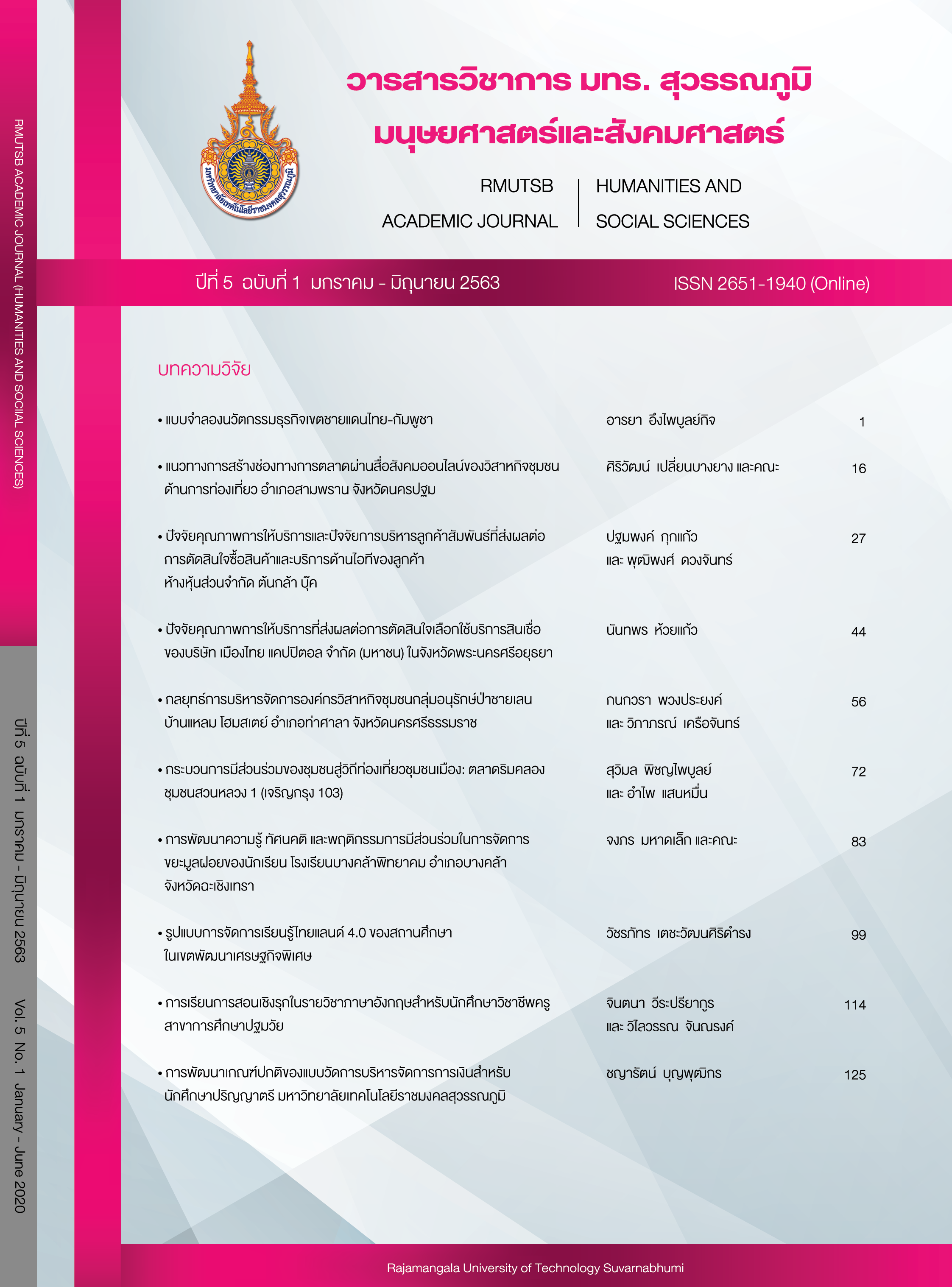Thailand 4.0 learning management model of institutes in special economy development area
Main Article Content
Abstract
The purposes of this study were: 1) to develop and determine the effectiveness of the learning management model "QSCCS Model", 2) to compare the effectiveness of implementing the "QSCCS Model in educational institutions and 3) to analyze policy recommendations in promoting and supporting the "QSCCS Model". In this study, the population included 25 experts and 28 school directors and teachers. The overall was 53 people. The sample was from 36 students. Experimental research design used in this study is Factorial Designs 2×3. The research tools composed of 2 parts, 3 qualitative evaluation tools and 7 quantitative evaluation tools. The major results showed that the "QSCCS Model" consisted of 5 steps; 1) learning to Question, 2) learning to Search, 3) learning to Construct, 4) learning to Communicate and 5) learning to Serve. The overall score was in the highest level (=4.64, S.D.=0.48). Learning achievement results using the "QSCCS Model", experimental group 1, was (
=18.83, S.D.=4.69) while using standard teaching and learning methods, experimental group 2, was (
=18.66, S.D.=4.59). When applying the results of the analysis of variance, it was found that the learning achievement scores of both experimental groups were not significantly different at statistically significant level at 0.05. By analyzing policy recommendations for promoting and supporting the "QSCCS Model" for educational institutions in the Special Economic Development Zone, it was found that 1) the quality of learners in Special Economic Development Zone should be promoted and supported 2) educational management and management processes in special economic development zones should be promoted and supported and 3) the teaching development process that focuses on the performance of the students should be promoted and supported.
Article Details
References
Chittradub, S. (2004). Characteristics and learning reports of young generation. Bangkok: Printing Factory of Business Organization, Khurusapha. (in Thai)
Jindanurak, T. (2017). Teachers and students in Thailand education 4.0. Electronic Journal of Open and Distance Innovative Learning, 7(2), 1-16. (in Thai)
Ministry of Education. Office of Policy and plan. (2014). The ASEAN educational strategic plan of the Ministry of Education. Bangkok: Amarin. (in Thai)
Namprama, P. (2013). The development of 21st century learning skills for becoming ASEAN citizens using research - based learning (RBL) in SOC 33202 ASEAN studies II for grade 12 students (Master’s thesis). Khon Kaen University, Khon Kaen. (in Thai)
Puangchan, S. (2015). Strategic management of vocational education of special administrative development zone in southern border provinces in the next decade (2015 - 2024) (Master’s thesis). Prince of Songkhla University, Songkhla. (in Thai)
Secretariat of the Prime Minister. (2016). Government policy statement of Prayuth Chan-O-cha, Prime Minister. Retrieved 5 December 2017, from http://www.thaipublica.org/20014/09/cop-watch-1/. (in Thai)
Suebnusorn, W. (2015). Expectations for educational changes in response to future demands of labor market in special economic zone provinces: A case study of Tak. Panyapiwat Journal of Social Sciences, 9(3), 39-49. (in Thai)
Summat, C. (2013). The development of educational supervision administration model for educational service area office in special development zone in the three southern border provinces (Doctoral dissertation). Naresuan University, Phitsanulok. (in Thai)
Thaiprayoon, K. (2017). The model on developing the integrated knowledge used in the special border economic zone (Doctoral dissertation). Burapha University, Chonburi. (in Thai)
Tankapipop, N. (2000). Statistics for educational research: Concepts and applications of variance analysis and analysis of covariance. Nakhon Pathom: Silpakorn University, Sanam Chandra Palace Campus. (in Thai)
Tanlaput, N. (2005). Management potential of the special border economic zone of Chiang Rai Province (Master’s thesis). Chiang Mai University, Chiang Mai. (in Thai)


